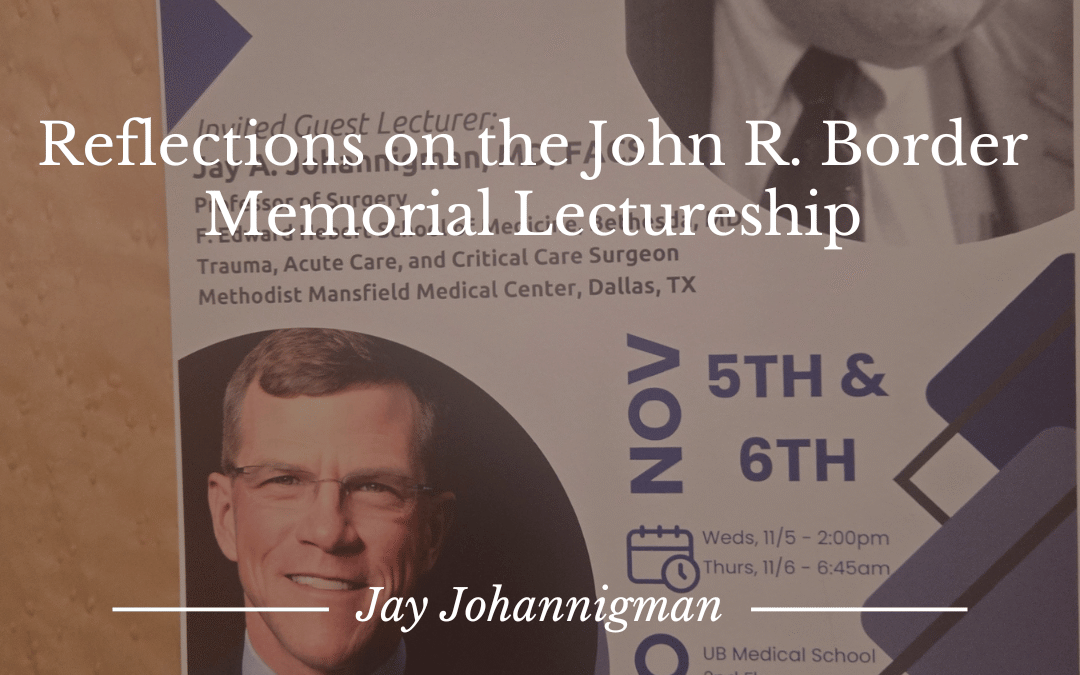This week, I had the honor of speaking at the John R. Border Memorial Lectureship at the Jacobs School of Medicine and Biomedical Sciences at the University at Buffalo. It was a meaningful experience to stand before a roomful of colleagues, students, and professionals dedicated to advancing medicine and trauma care.
Every time I get to share my experiences with the next generation of doctors, I feel like I’m starting over. This occasion gave me a chance to reflect on my career, which has included academic medicine, trauma surgery, and military service. What I learnt in each of those places still affects how I teach and do my job now.
Over the past four decades, my professional path has taken me through many environments, from university hospitals to combat support hospitals overseas. I have seen medicine practiced under the best and worst of circumstances. Those experiences have deepened my appreciation for preparation, teamwork, and adaptability. The field of trauma care demands constant readiness, whether you are in a modern trauma center or an improvised operating room far from home.
Having recently retired from active military service after more than forty years, I find myself in a period of transition and reflection. I’m thankful for the chance to have served, led teams under pressure, and helped raise the standards of trauma and critical care medicine. Every deployment, patient, and partnership made me more sure that medicine is not just a science, but also a calling that requires humility and strength.
Returning to civilian life has allowed me to reconnect with my roots in academic and community medicine. I have been lucky enough to go back to Cincinnati in the last few years. This city means a lot to me both personally and professionally. I first discovered a strong group of coworkers in Cincinnati who were very dedicated to improving trauma systems and teaching the next generation of doctors. Coming back to this community has reminded me of the power of mentorship and collaboration.
The John R. Border Memorial Lectureship reflected those same values. Dr. Border’s legacy lives on through his dedication to education and his belief in the importance of passing knowledge forward. Talking about him made me think about how much we owe to the people who helped us get where we are today. We all need help to be successful. We learned every skill, gained every insight, and performed every act of care with the help of others.
My remarks in Buffalo centered on that shared responsibility. Medicine is more than diagnosis and procedure. It is about humanity, discipline, and the willingness to keep learning even after decades in the field. Whether in the operating room, the classroom, or the community, the mission remains the same to save lives, support one another, and continue improving the systems that allow us to do both.
The audience at Buffalo brought thoughtful questions that showed genuine curiosity about the challenges and rewards of trauma medicine. Their engagement reflected the strong academic culture that defines the Jacobs School of Medicine. I left feeling encouraged about the future of our profession and confident that this next generation will carry the same sense of duty and compassion that guided Dr. Border and so many others who came before us.
Standing at that podium reminded me that retirement is never the end of service. It is simply a new chapter, an opportunity to teach, mentor, and share the lessons from years of experience in both the operating room and the field. The exchange of ideas and the spirit of learning that filled the auditorium in Buffalo reaffirmed my belief that the future of medicine is in capable and caring hands.
It was truly a privilege to take part in this memorial lectureship and to contribute, in some small way, to the ongoing conversation that drives trauma and critical care forward.

